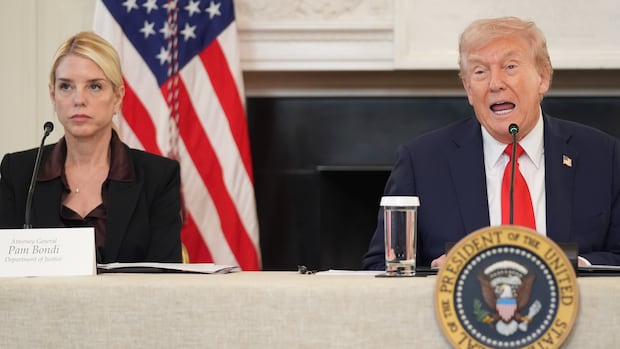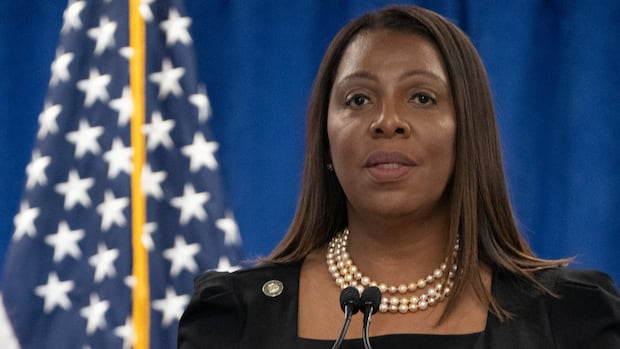New York Attorney General Letitia James, a longtime foe of U.S. President Donald Trump, was indicted on Thursday on criminal charges including bank fraud, the U.S. Justice Department said, as the administration seeks to use government power against those who have pursued investigations into him or publicly resisted his agenda.
Lindsey Halligan, the U.S. attorney for the Eastern District of Virginia, said James had been indicted on one count of bank fraud and one count of making a false statement to a lending institution. The Justice Department has been probing mortgage fraud allegations against her.
"The charges as alleged in this case represent intentional, criminal acts and tremendous breaches of the public's trust," Halligan said.
Each count is punishable by up to 30 years in prison, but should James be convicted, any sentence would be determined by a judge.
In a lengthy statement, James decried the indictment as "nothing more than a continuation of the president's desperate weaponization of our justice system."
"These charges are baseless, and the president's own public statements make clear that his only goal is political retribution at any cost. The president's actions are a grave violation of our Constitutional order and have drawn sharp criticism from members of both parties," she added.
Trump, a Republican who campaigned for re-election in part on a vow of retribution after facing a slew of legal woes since his first term in the White House ended in 2021, has repeatedly assailed James on social media and at political rallies as a partisan enemy.
New York state Gov. Kathy Hochul, a Democrat, said in a post on X, "What we're seeing today is nothing less than the weaponization of the Justice Department to punish those who hold the powerful accountable."
Case follows Comey indictmentThe indictment of James comes after a grand jury in Virginia on Sept. 25 indicted former FBI director James Comey on charges of making false statements and obstructing a congressional investigation. Comey pleaded not guilty on Wednesday.
Trump has regularly assailed Comey's handling of the FBI investigation that detailed contacts between Russia and Trump's 2016 campaign.
 Former FBI director James Comey speaks during the Canada 2020 Conference in Ottawa on June 5, 2018. (Justin Tang/The Canadian Press)
Former FBI director James Comey speaks during the Canada 2020 Conference in Ottawa on June 5, 2018. (Justin Tang/The Canadian Press)Both indictments come after Trump, in a Sept. 20 social media post addressed to U.S. Attorney General Pam Bondi, said James, Comey and U.S. Sen. Adam Schiff were "guilty as hell."
The indictments against James and Comey were both brought by Halligan, who was installed last month as the top federal prosecutor in Alexandria, Va. Her predecessor, Erik Siebert, resigned on Sept. 19, hours after Trump told reporters, "I want him out."
Siebert believed the evidence against Comey and James was weak, two people familiar with the matter told Reuters at the time.
In her statement Thursday, James called the decision to fire Siebert and replace him with a prosecutor who is "blindly loyal" to the president as "antithetical to the bedrock principles of our country," and she said she stood by her investigation of Trump and his company as having been "based on the facts and evidence — not politics."
WATCH | The charges against Comey:Former FBI director James Comey was charged with making a false statement to Congress after U.S. President Donald Trump appeared to urge U.S. Attorney General Pam Bondi to prosecute Comey and other perceived political enemies.As with the Comey case, Halligan presented the evidence against James to the grand jury by herself, without support from career prosecutors in the office, a person familiar with the matter said. Prosecutors in the office have previously expressed concerns about the strength of the evidence against her, Reuters previously reported.
Comey's lawyers are expected to argue Halligan was unlawfully appointed as U.S. attorney. If that motion is successful, it could complicate the cases against Comey and James down the road.
James is one of several Democratic state attorneys general who have sued to block Trump administration actions. She is best known for bringing a civil fraud case against Trump and his family real estate company in 2022. The case resulted in a $454.2 million US penalty against Trump after a judge found he fraudulently overstated his net worth to dupe lenders.
A New York state appeals court in August threw out the penalty, which had grown to more than $500 million with interest, but upheld the trial judge's finding that Trump was liable for fraud.
Both Trump and James's office are appealing to the state's highest court.
Trump denied wrongdoing and accused James's office of bringing the case against him for political reasons.
Allegations against James deniedThe Justice Department's mortgage fraud probe into James was opened after Federal Housing Finance Agency Director William Pulte, a Trump appointee, sent a letter to the U.S. Justice Department alleging James "falsified records" to obtain favourable loans on homes she purchased in Virginia and Brooklyn, N.Y.
In his referral letter, Pulte wrote that James indicated in a mortgage application that a Virginia property she was buying in 2023 would be her primary residence, even though she lived in New York.
WATCH | Trump says he wants more indictments:A day after the indictment of former FBI director James Comey, U.S. President Donald Trump suggested his other perceived foes could be next. Democrats were quick to sound the alarm in response, calling it a 'dark day for America.'James's lawyer Abbe Lowell has said that she mistakenly stated that the property would be a primary residence. He said she made it clear in other documents that it would not be her primary residence, and that her broker understood that.
The Justice Department, after receiving referrals from Pulte, has also opened mortgage fraud probes into Schiff, a Democrat who led the House of Representatives' inquiry that led to Trump's impeachment in 2019, and Lisa Cook, a member of the Federal Reserve Board of Governors appointed by Democratic former president Joe Biden.
Neither Schiff nor Cook has been charged with a crime, and they both deny wrongdoing.
Loans for primary residences can carry lower rates than mortgages on investment properties or second homes, which banks consider riskier. It is unclear whether James's, Schiff's or Cook's lenders took their intended use of the homes into account in determining rates.











